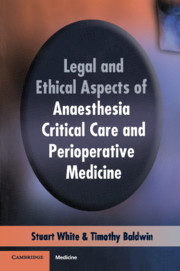Book contents
- Frontmatter
- Contents
- 1 Introduction
- 2 An introduction to the UK legal system
- 3 An introduction to medical ethics
- 4 Rights, and the Human Rights Act, 1998
- 5 Consent
- 6 Negligence
- 7 Confidentiality, and access to medical records
- 8 Abortion
- 9 Products liability
- 10 Research
- 11 Death and organ procurement
- 12 Professional regulation
- 13 Resource allocation
- Appendix: Important legal cases
- Index
1 - Introduction
Published online by Cambridge University Press: 18 August 2009
- Frontmatter
- Contents
- 1 Introduction
- 2 An introduction to the UK legal system
- 3 An introduction to medical ethics
- 4 Rights, and the Human Rights Act, 1998
- 5 Consent
- 6 Negligence
- 7 Confidentiality, and access to medical records
- 8 Abortion
- 9 Products liability
- 10 Research
- 11 Death and organ procurement
- 12 Professional regulation
- 13 Resource allocation
- Appendix: Important legal cases
- Index
Summary
Medicine evolves. The human life cycle – birth, reproduction, death – is unremitting, but technological and social advances mean that not only do personal and societal patterns of disease change continuously, but also does our ability to cure or ameliorate disease. Indeed, the definition of ‘disease’ still remains a controversial concept.
The most notable feature of medical progress over the last 30 years is that its rate of evolution has markedly increased. There may be any number of reasons for this, including (but not limited to) improvements in information technology, the demand-led ethos of Western consumerism, the medicalisation of certain human conditions and behaviours, refinements and developments in scientific methods, and various political agendas relating to healthcare.
For decades, centuries even, the moral principles of Western medicine were informed primarily by the teachings of the classical philosopher-scientists, namely Thales, Hippocrates and Galen. These ideas were modified by the prevailing philosophical doctrines of subsequent historical periods: mainly religion before the Renaissance, humanism in the Age of Reason, and theories of Human Rights that have developed since the Age of Enlightenment. However, in our post-modern, secular society, there is growing concern that the recent accelerated rate of medical advance has outstripped the rate at which consequent ethical dilemmas can be discussed, or resolved. In particular, rapid advances in certain fields (e.g. in genetic engineering) mean that new moral dilemmas arise where there has previously been minimal, or no, ethical debate.
- Type
- Chapter
- Information
- Publisher: Cambridge University PressPrint publication year: 2004



